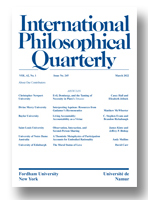
Chi-keung Chan
in International Philosophical Quarterly, Volume 64, Issue 3 (2025)
Abstract: This paper presents an enactive approach to Neo-Confucian ethics, with a particular focus on Wang Yangming’s (王陽明 1472–1529) concepts of the heart-mind (xin 心) and moral knowledge (liangzhi 良知). While traditional ethical models in Song-Ming Neo-Confucianism emphasize grounding ethical life in universal rational principles or in the cultivation of a moral mind, this paper seeks to clarify these assumptions by drawing on the enactive insight of groundlessness. It argues that, rather than resting on a fixed and isolated metaphysical ground, any moral mind, if it exists, must manifest through embodied interaction and engagement with the world. This perspective reconceptualizes the moral mind and liangzhi as more than cognitive processes confined to the head; instead, they are understood as part of an integrated mind-body-world system, characterized by embodied, contextually grounded, and beyond-self-aware coping mechanisms. By redefining these elements, this paper aims to deepen our understanding of Neo-Confucian ethics and contribute meaningfully to broader philosophical discussions on moral agency, autonomy, and moral responsibility.
About the author: Chi-keung Chan was a HYI Visiting Scholar from 2022-23.
